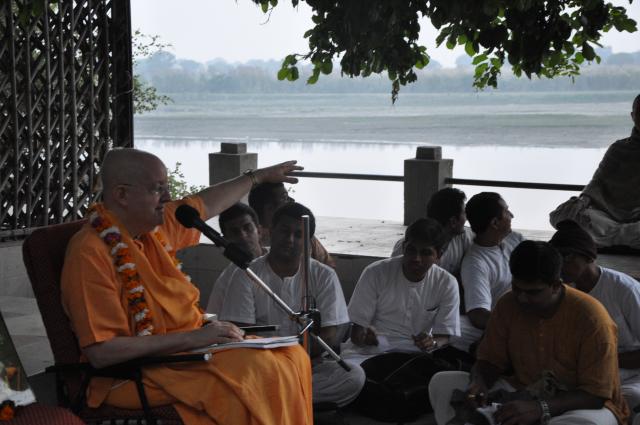Question : If a person takes to Krishna consciousness based on his or her prior karma, then what is the need to preach to them? Is that why there is no really no concept of preaching in Hinduism?
Answer by Romapada Swami :
Actually, you may be surprised to know that a person’s taking up Krishna consciousness is not in the least created by one’s previous pious or impious activities, because Krishna consciousness is completely beyond the jurisdiction of material activities. Srila Visvanatha Cakravarthy Thakur elaborately discusses this in his book `Madhurya Kadambini’ (Chapter 1) where he states that Bhakti is supremely independent. If a material activity can be the cause of one’s attaining bhakti, it means bhakti has a material cause and is therefore not completely spiritual! Then how at all does one get bhakti? If it were causeless, why is that only some people take to Krishna consciousness? He examines different possibilities finally concluding that bhakti is the cause of bhakti. More specifically, one gets the seed of bhakti from another bhakta. When one meets a devotee carrying bhakti in his/her heart, one is entitled to receive that seed of bhakti if one responds favorably to that association, irrespective of what their previous pious / impious credits are. So the conclusion is there is actually GREAT need to `preach’ or distribute Krishna consciousness.
I would not agree that there was no concept of preaching in the Vedic tradition, because as we see, all the great acaryas such as Ramanujacarya, Madhvacarya, even Sankaracarya, and Caitanya Mahaprabhu and His followers extensively traveled, preached, wrote books and trained their followers similarly, driving out opposing materialistic and atheistic conceptions and inspiring the masses towards spiritual life. It is an intrinsic principle of Vedic culture to share with others the knowledge and good fortune one receives, especially the fortune of transcendental knowledge and try to engage everyone in devotional service, knowingly or unknowingly. In fact, the whole social structure of varnashrama was structured in this way so that the brahmanas could teach all others in the community to live a god-centered life and that is a wonderful, natural way of preaching to and training every member of society!







